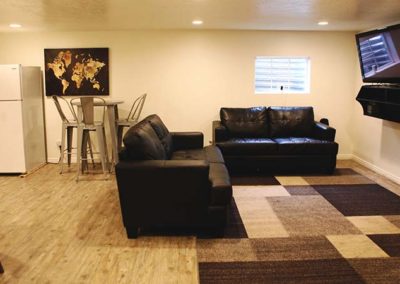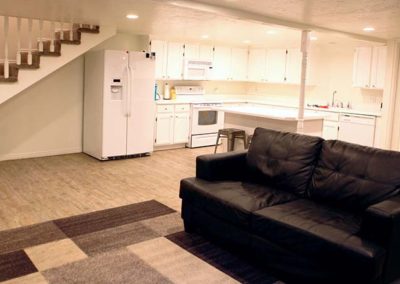At The Crossroads Glossary
A Transitional Living Program Built for Long-Term Fulfillment.
At ATC, we believe in pursuing excellence, embracing change, acting with integrity, and serving others. Everyone has the potential to live their best life – our job is to help you get there.
ADD
n. noun
Attention-deficit/hyperactivity disorder (ADHD) is a chronic, yet very common condition that effects millions of children and young adults alike. ADHD is a mixture of several different problems that may include, difficulty sustaining attention, hyperactivity and impulsive behavior.
Often times, young men and women who struggle with ADHD also have a low self esteem, trouble maintaining relationships and may display poor performances in school and on the job. While symptoms do sometimes subside with age, some individuals never outgrow their ADHD symptoms. With adequate treatment however, young men and women can learn how to control their ADHD and use their ailment to their advantage.
While there is no cure for ADHD, treatment can greatly help deal with symptoms. Treatment varies, but usually includes medication and therapy. The earlier the diagnosis of ADHD, the better treatment is able to lessen the symptoms of ADHD. Therefore, it is critical for young men and women to seek the necessary treatment options for their ADHD.
Bipolar Disorder
n.noun
/bi·po·lar/ /dis·or·der/
Mayo Clinic describes bipolar disorder as : “Bipolar disorder sometimes called manic-depressive disorder — is associated with mood swings that range from the lows of depression to the highs of mania. When you become depressed, you may feel sad or hopeless and lose interest or pleasure in most activities. When your mood shifts in the other direction, you may feel euphoric and full of energy. Mood shifts may occur only a few times a year, or as often as several times a day. In some cases, bipolar disorder causes symptoms of depression and mania at the same time.
Young adults who struggle with bipolar disorder will have high highs and lowest of lows, they can be extremely happy or irritable. Troubled young adults are more likely to express their sadness or depression with anger. troubled young adults, much like troubled teens, have a difficult time expressing their feelings, therefore loved ones, peers and authority figures alike, must approach young adults struggling with bipolar disorder and suggest they find treatment for their disorder.
Impulse Control
n.noun
/im·pulse/ /con·trol/
The medical dictionary defines impulse control as: The Psychology The degree to which a person can control the desire for immediate gratification or other; impulse control may be the single most important indicator of a person’s future adaptation in terms of number of friends, school performance and future employment.
Those who struggle with discipline tend to have a low impulse control. With a lack of discipline, a young man or woman is vulnerable to choosing instant gratification, even if it is harmful to do so. Therefore, if a young man or woman has a low impulse control, it is crucial that they work on building good discipline habits.
To young men and women who have let their impulse control, or lack thereof, effect or even destroy their life, there is hope. Therapeutic treatment such as, residential treatment or independent living can address disciplinary problem areas and provide young men and women with the appropriate treatment tools they need to overcome them.
interpersonal Relationships
n.noun
/in·ter·per·son·al/ /re·la·tion·ships/
Close relationships are sometimes called interpersonal relationships. The closest relationships are most often found with family and a small circle of best friends. Interpersonal relationships require the most effort to nurture and maintain. These are also the relationships that give you the most joy and satisfaction.
Much like a living, breathing organism, interpersonal relationships have a beginning, a life span, and an end. Interpersonal relationships grow and evolve gradually, as people get to know each other and become closer, personally and emotionally, or these types of relationships will deteriorate as people drift apart from their lives and form relationships with others.
Interpersonal relationships are vital and one of the most important relationships a young man or woman can have. If a young man or woman has strong, healthy interpersonal relationships they are less likely to fall victim to drug and/or alcohol addiction or other types of negative behaviors.
potential suicide
po.ten.tial / su.i.cide /risk
n.noun
A potential suicide risk is an individual that shows symptoms of a person who is at risk of acting on suicidal ideation. These symptoms may include depression, detachment from reality, lack of concern for one’s well-being, irrational and dangerous behavior, acts of self-harm, etc. Whether a person displaying symptoms of suicidal risk are seeking attention, rather than truly planning on committing suicide, they too are at risk and should receive immediate, professional psychiatric treatment.
Potential suicide risks should always be treated with a great amount of care and attention. This, of course, is because regardless of actual intention, suicidal ideation can lead to actuality.
Many young people who suffer from suicidal ideation, do not in fact plan on ever killing themselves. However, they display riskier behavior, including drug abuse and self-harm as a form of ‘self-medicating.’ Additionally, potential dangers, such as self-destructive self-medicating, may lead to accidental fatalities.
12 Steps
twel.ve / step / pro.gram
n.noun
A 12 step program is a set of guiding principles (sometimes accepted by members as being ‘spiritual principles’) outlining a course of action for tackling problems including alcoholism, drug addiction and compulsion. Originally designed to treat alcoholism, the 12 steps has branched out as a rehabilitative tool assisting addicts in recovering from all types of substance abuse.
The 12 steps are as follows:
1. We admitted we were powerless over addiction, that our lives had become unmanageable.
2. Came to believe that a Power greater than ourselves could restore us to sanity.
3. Made a decision to turn our will and our lives over to the care of God as we understood Him.
4. Made a searching and fearless moral inventory of ourselves.
5. Admitted to God, to ourselves, and to another human being the exact nature of our wrongs.
6. Were entirely ready to have God remove all these defects of character.
7. Humbly asked Him to remove our shortcomings.
8. Made a list of all persons we had harmed, and became willing to make amends to them all.
9. Made direct amends to such people wherever possible, except when to do so would injure them or others.
10. Continued to take personal inventory, and when we were wrong, promptly admitted it.
11. Sought through prayer and meditation to improve our conscious contact with God as we understood Him, praying only for knowledge of His will for us and the power to carry that out.
12. Having had a spiritual awakening as the result of these steps, we tried to carry this message to addicts,
and to practice these principles in all our affairs.
The 12 steps is the foundation of many treatment programs plan of action in rehabilitating addicted individuals. For addicted people seeking for such a program, it is imperative to research potential treatment programs, in order to ensure of successful rehabilitation.
academic credits
ac.a.dem.ic/ cred.its
n.noun
Credits are one of the primary methods used to determine and document that students have met academic requirements, typically at the high school level. Additionally, This method is the preferred choice by the majority forms of education. Academic credits are also utilized by higher educational institutes such as colleges or trade schools. Additionally, This method is the preferred choice by the majority forms of education.
Earning academic credits is typically the only way a student can earn a desired diploma or certificate of completion of schooling. If a student does not accumulatively earn a certain amount of crediting marks, they will fail to graduate. However, credits are something that an individual can restore, earn, or make-up even after their formal education has concluded.
academics
n.noun
/ac·a·dem·ics/
Merriam-Webster’s Dictionary defines Academcis as : of or relating to a college, academy, school, or other educational institution, especially one for higher education. Academics are a person’s education from an institution, school or otherwise. Grade school, high school and college are all institutions where an individual learns academic material.
Academics are crucial in bettering one’s life. With lack of academics, a young man or woman is ill-prepared for the ‘real world’ and therefore, will struggle with living an independent, healthy and productive lifestyle. Whether academics come in the form of traditional schooling or vocational training, a young adult can greatly improve their life with studying some form of academics. Therefore, if a young adult lacks academic knowledge, it is imperative they make the correct lifestyle changes it takes in order to further their academic and/or vocational education.
active lifestyle
/ac.tive/ /life.style/
n.noun
An active lifestyle is a healthy way of living. This proactive lifestyle approach includes eating the healthy, exercising, and abstaining from negative behaviors and habits. Living a healthy lifestyle is essential for achieving a healthy mind and body. Failing to live an active lifestyle, an individual is susceptible to negativities such as depression, obesity, and low self-worth.
Individuals, who choose to live an active lifestyle, are happier than those who don’t. By eating the healthy and exercising, a person is less likely to fall victim to psychological disorders and a life of mediocrity. An active lifestyle is essential for balancing hormones and activating energy levels. A person who fails to live an active lifestyle is likely to be lazy and depressed, further causing problems within their personal life.
By living an active lifestyle, an individual is open to more opportunities. For example, employers are more likely to employ a fit and active individual based on their optimistic and proactive disposition.
Addiction
n.noun
/ad·dic·tion/
The American Society of Addiction Medicine defines addiction as : Addiction is characterized by inability to consistently abstain, impairment in behavioral control, craving, diminished recognition of significant problems with one’s behaviors and interpersonal relationships, and a dysfunctional emotional response.”
Similar to other chronic diseases, addiction may involve cycles of relapse and a mental state of remission. If left untreated, or serious attempts at recovery, the progression of addiction can easily result in dire, and sometimes even fatal, consequences.
Addiction is all too common in the United States. Although common, addiction is a very serious condition and needs to be treated as if it were a deadly disease. Young adults who struggle with some type of addiction need to seek treatment for their ailments with appropriate and necessary eagerness to find a cure.
adulthood
n.noun
/a·dult′hood/
the timeframe of growth when physical maturation is has been attained and specific biologic, mental, cultural, individual characteristics, and various other developments concerned with getting older have taken place. Starting post-adolescence, this period of time is often grouped into categories by age, from young adulthood, which is generally considered to be between the ages of 19 and 45.
Adulthood, much like adolescence, can be a turbulent and difficult transitional period for many young men and women. When young men and women struggle with transitioning into adulthood, they will sometimes self medicate, or distract themselves with negative behaviors such as drug/alcohol abuse, which in turn, can cause depression and eventually lead to fatal consequences. It is for this reason that it is imperative for young adults too seek assistance if they find the transition into adulthood too difficult or overwhelming.
adversity
/ad·ver·si·ty/
n.Noun
Adversity is defined as the difficulties or hardship. Also known as trials.
Adversities are a part of life that every person encounters and must face. They are different for each person and vary in many different shapes and sizes. Adversity can come from the loss of a loved one or of the loss of a job to the simple misplacement of a wallet. No matter what it may be adversities are always some sort of a setback. They may be the cause of a personal fault such as disobedience or pride but may also come from the many factors caused by life.
Adversity is something that if looked at in the right way can provide some kind of reward in the end such as newfound knowledge or strength. It is important to find support/someone or a group that can help give strength when faced with adversities.
alcohol
n.noun
/al·co·hol/
a colorless volatile flammable liquid that is the intoxicating constituent of wine, beer, spirits, and other drinks, and is also used as an industrial solvent and as fuel.
When ingested, alcohol can be a deadly intoxicant. Teens and adults alike are more prone to make fateful and negative choices while drinking alcohol. A deadly intoxicant, alcohol has destroyed and ripped apart the lives of millions and yet, remains to be the drug of choice of young adults nationwide.
Young men and women may not have fully developed minds when they first build a habit of drinking. This is highly problematic. If a young person’s brain is not fully developed, he/she is not able to fully process the potential consequences that may arise when becoming intoxicated.
When drunk, young men and women commit and act out heinous activities which they would normally never commit or act out. Teenage pregnancy, driving under the influence, fighting and other consequences are more likely to occur while young adults drink.
If a young man or woman is addicted or dependent upon drinking alcohol, he/she needs to seek immediate treatment for serious addiction.
alcohol addiction
al.co.hol / add.ic.tion
n.noun
The mayo clinic defines alcohol addiction as, “a chronic and often progressive disease that includes problems controlling your drinking, being preoccupied with alcohol, continuing to use alcohol even when it causes problems, having to drink more to get the same effect (physical dependence), or having withdrawal symptoms when you rapidly decrease or stop drinking. “
Statistics shows that young men and women (ages 13-25) suffer from alcohol addiction, more so than older and more mature adults. This is because the human brain isn’t fully developed until a person is well into their 20’s. When a person abuses alcohol at a younger age, that individual is damaging their brain before it has a chance to fully develop. Additionally, young men and women who abuse alcohol at an early age are at high-risk of developing a life-long habit.
Anger
/an·ger/
Anger is a normal emotion with a wide range of intensity, from mild irritation and frustration to rage. It is a reaction to a perceived threat to ourselves, our loved ones, our property, our self-image, or some part of our identity. Anger is a warning bell that tells us that something is wrong.
Although anger is a common emotion that everyone experiences at one time or another, it is an emotion that if not properly controlled, can be highly destructive. People that struggle with anger issues are in need of therapeutic restoration known as, anger management.
Young adults who struggle with anger issues are at high risk of self destructive tendencies. If left unchecked, or untreated, anger can easily destroy someone’s life, reputation and/or relationships with loved ones. It is for this reason that it is absolutely critical and necessary to receive help if afflicted by anger issues.
anger management
n.noun
/an·ger/ /man·age·ment/
Anger management is the exercise of recognizing signs of an individual’s anger and taking action in order to calm the individual down. It is through this action that the angered person is then able to cope with an anger in a positive and productive manner. Anger is a normal, healthy emotion when you know how to express it appropriately.
Learning how to manage anger can be a frustrating and daunting process. It is for this reason that it is crucial to seek therapeutic treatment options. Uncontrolled anger, or lack of anger management skills can result in a young adult making a fateful choice that could effect them for the rest of their lives.
There are many different treatment options for young adults who struggle with managing their anger. Individual and group therapy outpatient programs as well as residential inpatient treatment programs are viable options for a young man or woman to consider.
Aptitude
n.noun
/ap·ti·tude/
Aptitude refers to a person’s talents or ability to do certain things better than others. An aptitude is something you’re good at. A rock star might have an aptitude for energizing an audience, or for trashing his hotel room.
Aptitude, like talent, is something that can be inherently passed down from generation to generation. However, aptitude doesn’t always mean a person is born with it, sometimes aptitude can be acquired through a person’s abilities and hard work.
Young men and women who possess certain aptitudes for different things ( computer skills, writing skills, artistic abilities etc.) should be encouraged to develop these skills and use them to better their lives. Unfortunately, young people who possess aptitudes will sometimes venture off track and flounder due to negative behavioral patterns and thinking. For these young men and women, it is imperative they receive therapeutic assistance in correcting their life’s path and learn to use their gifts to the best of their abilities.
aspergers syndrome
n.noun
The medical dictionary describes Asperger’s syndrome as a developmental disorder related to autism and characterized by higher than average intellectual ability coupled with impaired social skills and restrictive, repetitive patterns of interest and activities.
People who suffer from Asperger syndrome generally have few facial expressions, generally limited to anger and misery. Men and women who suffer from Asperger’s syndrome are usually misconceived as being rude, or selfish. This is because people suffering from Asperger syndrome tend to be stuck in their own world and are generally introversive.
Asperger syndrome is classified mild form of autism, or high-functioning autism. Compared to severe forms of autism, individuals who have Asperger syndrome live relatively normal lives. However, it is imperative for young adults who suffer from Asperger syndrome to seek therapeutic assistance. Young adults who have Asperger syndrome are more likely to suffer from depression, stress, and are prone to negative behaviors such as, violent outbursts, and chemical or intoxicant dependency.
attitude
/at·ti·tude/
n.Noun
Attitude is defined as the way of thinking or feeling about someone or something, typically reflected in a person’s position of the body proper to or implying an action or mental state.
The attitude of someone can change very easily or can be a very difficult process. External forces such as: conflict, events, experiences, surrounding people and the environment can affect the attitude of a person.
Attitude is everything in the aspect that the feelings and views towards something or someone can and will affect the outcome of interactions with those things. The way someone views or feels towards an experience, person, or event can differ greatly just on the attitude of the person. Attitude effects actions and also emotion.
Attitude doesn’t just affect one person it affects everyone that surrounds the person. If someone is happy typically the people that surround will be happier than those that surround someone that is depressed or sad.
behavioral change
be.hav.ior.al / change
n.noun
Behavioral change a transformative process an individual undergoes in order to promote positivity in their decision-making. Behavioral change is necessary for individuals who continuously make poor lifestyle choices. If an individual continuously makes poor choices, their life can quickly escalate into a state of chaos.
Behavioral change often requires professional, psychological treatment. Additionally, young men and women who are in need of behavioral change, can enroll in a residential treatment facility to overcome their self-destructive behavioral patterns. If a person, who requires genuine residential treatment, fails to seek treatment for their behavior, their behavior will continue to affect their life negatively.
There are numerous intensive treatment programs that advertize long-lasting behavioral change within struggling young people and teens. However, not all programs are as effective as they lead people to believe. Moreover, it critical to do as much research about the particular treatment program they are considering.
bipolar disorder
Bi.pol.ar / dis.or.der
n.noun
Mayo Clinic provides the following definition of ‘bi-polar disorder’: “Bipolar disorder sometimes called manic-depressive disorder — is associated with mood swings that range from the lows of depression to the highs of mania.”
Those who suffer from bipolar disorder may be misinterpreted by others due to their abnormal behavioral patterns. This misunderstanding can lead bipolar afflicted persons to experiencing difficulty in developing relationships, causing further, adverse, psychological malady. Furthermore, it is not uncommon for bipolar afflicted individuals to turn to destructive behaviors, such as drug addiction or self-harm.
Treatment for young adults struggling with bipolar disorder
There are numerous treatment options for young men and women who suffer from bipolar disorder. However, it should be noted, some young people require more intensive treatment than others. Where traditional treatment helps some, others require 24-hour supervision and intensive therapy. For young men and women with severe issues stemming from bipolar disorder, residential treatment may be the best solution.
career skills
n.noun
Career skills refer to the talent and expertise a person possesses to perform a certain job or career. These skills make an individual a valuable acquisition for employers to employ when choosing applicants. Having skill such as career skills propel an individual above his/her competition and make them a marketable commodity to employers.
When a person lacks career skills, they are vastly unappreciated in terms of employment opportunities. Without these skills, it makes finding employment difficult, sometimes almost impossible.
Fortunately for young men and women who lack career skills, solutions such as residential treatment centers, transitional living and independent living programs are designed to assist them. These therapeutic facilities assist young adults who are ill prepared for living a productive, adult lifestyle. While enrolled at one of these facilities, young men and women will be taught how to achieve life skills, like career skills and how to apply these skills in order to better themselves.
change process
Change / pro.cess
n.noun
The term, “change process,” refers to the therapeutic development and growth of a person’s psychological and behavioral state. This change takes place after a psychologically struggling individual undergoes some form of therapeutic effort in order to better their mental state. There are various methods in which an individual can achieve this change.
People, who are in need of undergoing a process of change, are those whose personal life is suffering due to their behavioral pattern, as well as experiencing mental health. Additionally, those who are addicted to harmful substances or some other form of abuse, are in need of immediate therapeutic assistance. These individuals are in need of clinical, or residential therapy in order to promote a ‘change process that will lead to personal growth and betterment.
clinical excellence
/clin.i.cal/ /exc.ell.ence/
n.noun
Clinical excellence refers to a clinically excellent physician.
Johns Hopkins Medicine defines such a physician as, “The clinically excellent physician has achieved a level of mastery in communication & interpersonal skills, professionalism & humanism, and negotiation of the health care system. Such physicians are exemplary with respect to diagnostic acumen, knowledge, and their scholarly approach to clinical practice. They exhibit a passion for patient care, and they explicitly model all of the above to medical trainees, earning them a reputation for being exceptional.”
Clinical excellence is especially important regarding the practice of psychology. Men and women, who suffer from some form of psychological deficiency, are in need of therapy from a psychological professional. Moreover, the excellence and care of this professional is a key factor in the outcome a suffering person’ s psychiatric treatment.
clinical help
n.noun
Clinical help is the assistance of a medical, or therapeutic team whose mission is to provide therapeutic or medical care to suffering patients. This type of care is necessary when dealing with therapeutic, addictive and emotional recovery, as well as typical medical practices.
Those who struggle with therapeutic and psychological disorders, drug addiction or other negative, behavioral problems, can find therapeutic rehabilitative wellness from the assistance of clinical help.
Clinical help has helped countless young men and women who were incapable of correcting therapeutic ailments that destroyed their lives on their own accord. Young men and women who seek clinical help are able to admit that they cannot fix their serious issues on their own, and in fact, need outside assistance from therapeutic and drug addiction experts.
college dropout
n.noun
/col·lege/ /drop·out/
A college dropout is someone who enrolled in college, but for one reason or another, dropped out. Dropping out has become the norm and people actually graduating a rarity.
Young men and women who drop out of college, do so, for a variety of reasons. Whatever was the driving force urging them to quit, one fact remains, there are more young people dropping out of college than ever before.
Distractions such as, drugs and alcohol abuse and addiction, extra curricular activities, and a complete lack of interest involving furthering one’s education are all factors for young men and women dropping out of college.
If a young man or woman drops out of college due to their inability to function in the world, lack of self discipline, or simply is ill prepared in dealing with the regular stresses of being an adult, can find therapeutic restoration at an independent living program, transitional living program or residential treatment center for troubled young adults.
college preparatory class
coll.ege/ /prep.par.a.to.ry/
n.noun
A College Preparatory class is an educational tool designed to assist aspiring college students with getting into a desired college.
Although college preparatory classes are typically utilized by honor students attending high school, adults who strive to better their education, may also take advantage of these introductory, skill building classes. Moreover, adults who have aspirations to obtain a degree, would behoove themselves by opting to partake in some form college preparation.
Troubled young adults in treatment
Young adults, who are in recovery from harmful substance addiction, may feel as though they have missed their opportunity to progress their life of academia. However, these young men and women who strive for rehabilitation, may also pursue college aspirations while in treatment. Fortunately for motivated, recovering young addicts, there are many residential treatment programs that offer college preparatory classes, as well as psychiatric treatment.
community
n.noun
/com·mu·ni·ty/
The Merriam-Webster dictionary gives several definitions for the word community:
A group of people living in the same locality and under the same government.
b. The district or locality in which such a group lives.
c. A group of people having common interests: the scientific community; the international business community.
When pertaining to troubled young adults, a community is a very important subject. Whether it’s the family at home or the friends they choose to hang out with, a young man or woman is surrounded by an influencing community at all times. These community factors play a big role in the behavior and overall attitude in young adults.
Much like that of a troubled teen, if a troubled young adult surrounds themselves with a negative peer group, he/she can be expected to also fail and live a negative lifestyle. However, if a young man or woman surrounds themselves with a positive, nurturing peer group, he/she can expect to live a fruitful, productive lifestyle.
consequences
n.noun
/con·se·quences/
Consequences is defined as : the effect, result, or outcome of something occurring earlier. A consequence is the direct result of a person’s decision making, positive or negative. If an individual makes positive choices ( doing schoolwork, working hard etc.), the individual can expect positive consequences (good grades, promotion etc.). However, if an individual makes poor choices, they then can expect negative consequences ( poor grades, demotion etc.)
Consequences can make or break a person therapeutically. Like teens, young adults tend to struggle with negative consequences. Poor choices such as, drug addiction can ultimately destroy the lives of young adults and overwhelm them with negative consequences. Negative consequences like, prison or failing relationships are a direct result of a young person’s decision making.
Treatment solutions such as, residential treatment, group homes, wilderness therapy, transitional and independent living programs are all viable choices for young men and women who are overwhelmed by the consequences of their poor decision making.
decisions
n.noun
/de·ci·sions/
Decisions are the choices a person makes. Depending on whether a person’s choices are positive or negative, decisions a person makes greatly effects on how happy he/she and how productive their lives are.
Decision making is very habitual. If a young man or woman continuously makes poor choices, the longer they will be stuck in a cycle of poor decision making. However, if one makes a habit of making positive choices, the easier it is to make positive choices in the future.
A young man or woman who struggles with decisions that arise in every day life, generally also struggle with lack of discipline. Without habitual good choices, there is no discipline. Without discipline, there is no order, and if there is no order, then a person’s life is chaotic bedlam.
dependent behavior
Dependent behavior refers to a person’s need to depend on others or other things in order to function. Dependent behavior can describe a person struggling with drug addiction, as well as a person suffering from negative behaviors and/or relationships.
Dependent behavior is very dangerous. A person’s need to depend on outside variables such as, relationships or habits such as, drug addiction, should be looked at and treated as a disease. Rehabilitation in the form of therapeutic or substance abuse rehabilitation should be sought after if dependent behavior has become an issue.
If left untreated, dependent behavior can become more than a lifestyle choice, and can completely take over a person’s life. Depenedent behavior can lead to negative emotions and consequences such as, depression and suicidal thoughts. Young men and women who struggle with dependent behaviors can find solace in therapeutic treatments such as, rehabs and residential treatment centers.
destructive behaviors
Destructive behaviors can be defined as : negative behavioral patterns that a person displays that negatively effect, and sometimes even destroy a person’s life. The reasons for a person displaying destructive behaviors can many and differentiate between issues like, therapeutic disorders and drug addiction. Whatever the case may be, it is imperative for people who display destructive behaviors to seek adequate, therapeutic treatment.
Young adults who display destructive behaviors do so, for a variety of reasons. These reasons, or factors may include, drug addiction, immaturity, laziness, or psychological disorder. Young adults who display such behaviors may be ill equipped and lack basic living skills that come with the territory of being a productive adult. Young men and women who are incapable of overcoming such negative behaviors are in serious need of therapeutic and psychological rehabilitation.
Fortunately for young men and women struggling with destructive behaviors, solutions such as residential treatment and transitional living programs offer the therapeutic guidance and wellness they need so desperately.
drug abuse
n.noun
/drug/ /a·buse/
Compulsive, excessive, and self-damaging use of habit forming drugs or substances, leading to addiction or dependence, serious physiological injury (such as damage to kidneys, liver, heart) and/or psychological harm (such as dysfunctional behavior patterns, hallucinations, memory loss), or death. Also called substance abuse.
Drug addiction and abuse is a serious affliction for anyone to struggle with. The life changing consequences that arise from drug abuse can be seriously debilitating and even fatal. Serious health risks, as well as legal troubles are enough for anyone to choose not to abuse drugs, but still, drug abuse continues to be a national epidemic that challenges our nation’s youth
Therapeutic treatment options such as, rehab, transitional living and residential treatment facilities are all viable options for those battling drug and alcohol addictions.
educational goal
Ed.u.ca.tio.nal / goal
n.noun
Education goals are an individual’s particular, educational aspirations that they wish to achieve. These goals can be personally set forth, or by an outside source, such as an academic authority.
Like most goals, educational goals can be either long-term or short-term. The longevity and difficulty of achieving said goals, depend on the individual’s aspirations, motivation to reach these aspirations, and what these goals accomplish. For instance, passing a mid-term test is an example of a short-term goal, whereas earning a doctorate, would be considered to be a long-term goal. Moreover, consistently meeting short-term, academic goals allows an individual to reach their hard-fought, long-term goals.
Setting a pattern of obtainable, tangible endeavors, an individual can achieve educational fulfillment, whatever that may entail. Moreover, it is important for individuals to use goals as a sort of stepping stone in order to reach their end goal. By consistently reaching small, less important, short-term, educational aspirations, a young man or woman relives the overwhelming and daunting notion of achieving their long-term goals, which may take several years.
effective treatment
ef.fec.tive / treat.ment
n.noun
In psychiatry, effective treatment refers to therapeutic practices that result in a definite psychological change in a mentally ailing patient. Efficient treatment can be achieved through vastly different methods. A person’s susceptibility to receive an adequate treatment greatly depends on the individual’s afflictions and the severity of said disorders.
The overall effectiveness of a psychiatric treatment depends on numerous factors. These factors may include the person’s severity of mental ailment, the particular mental malady itself, and the willingness of the patient to overcome their psychological maladies. While some may benefit from the services of traditional therapy, others require far more intense, therapeutic venues in order for the treatment to be effective.
Effective psychiatric treatment also includes the rehabilitation of addicts. Addicts, themselves, are suffering from numerous psychological issues and, therefore, require specialized, therapeutic attention. Moreover, treatment options, such as residential treatment, may be the most effective form of treatment for addicted, suffering young men and women.
emotional disorder
e.m.o.tion.al/ /dis.or.der/
n.noun
Emotional disorder is a broad category which is used commonly in educational settings, to group a range of more specific perceived difficulties of adolescents and young adults.The most common emotional disorders include Attention-Deficit Hyperactivity Disorder (ADHD), Autism, bipolar disorder and anxiety disorder. Most emotional disorders can be treated, allowing afflicted individuals to live a normal, fruitful life.
A person suffering from an emotional disorder, may find difficulty in navigating everyday life. So much, in fact, that the individual may turn to negative sources, such as self-harm or substance abuse. Furthermore, afflicted individuals may exhibit negative behaviors such as anger, rebelliousness, and even violence out of sheer frustration. If dealt with alone, emotional disorders may make a person’s life a living nightmare. Moreover, people suffering from emotional disorders need to seek appropriate treatment for their destructive ailment.
emotional growth
e.mo.tion.al / growth
n.noun
Emotional growth is the development of a person’s ability to properly handle emotions. An individual’s ability to control their emotions during times of stress is an invaluable skill. Additionally, like any skill, the ability to control emotions can be trained and developed.
Emotional growth is a developmental process. If not practiced, a person’s emotional control can diminish, further putting the individual at risk of making rash, reactive decisions. When a person fails to maintain control over the emotions, any action they choose to act on may be damaging. For this reason, it is critical for an individual, who has poor emotional health, to develop coping skills to which they can utilize under times of duress.
By developing coping skills in order to control emotional response, an individual is not only displaying maturity, but also engaging in emotional growth. However, controlling heated emotional response under stress is not an easy venture. Moreover, this process of emotional maturity may require the assistance of residential treatment.
emotional health
Emo.tion.al / health
n.noun
Emotional health is an individual’s mental state of well-being. Like physical health, emotional health can be damaged and requires professional and clinical treatment. Those who suffer from a weak state of emotional health, need psychiatric rehabilitation, much like a person who suffers from a physical ailment requires medical attention. Mental therapy can provide adults and children, who suffer from poor emotional health, with the foundation of rehabilitative fundamentals necessary for achieving a full recovery.
Signs that a teen may need treatment for poor emotional health include depression and behavioral disorders.
emotional intelligence
Emotional intelligence is the ability to identify and manage your own emotions and the emotions of others. It is generally said to include 3 skills:
1. Emotional awareness, including the ability to identify your own emotions and those of others;
2. The ability to harness emotions and apply them to tasks like thinking and problems solving;
3. The ability to manage emotions, including the ability to regulate your own emotions, and the ability to cheer up or calm down another person.
If a young adult has low emotional intelligence life can be an agonizing and daunting venture. A young person who has low emotional intelligence is not equipped to make rational, responsible decisions in times of difficulty or stress. Without proper treatment for lack of emotional intelligence, young men and women are susceptible to negative behaviors, such as self harm or drug addictions.
employment
n.noun
em·ploy·ment
The Merriam-Webster Dictionary gives the following definitions for employment:
a : activity in which one engages or is employed <seeking gainful employment>
b : an instance of such activity
3: the act of employing : the state of being employed
Employment may be a difficult issue for some young men and women to deal with. The difficulty of finding employment may be the culmination of several factors such as, mental illness, therapeutic disorders, laziness, lack of motivation, lack of jobs in one’s community, or addictions to drugs and/or alcohol. Regardless of the reason of difficulty finding employment, it is imperative for young men and women to fix whatever issues that are preventing them from finding employment.
Young men and women who lack certain, basic life skills can find the help they need in therapeutic treatment programs like, residential treatment centers, transitional living programs and independent living programs for troubled young adults. These types of facilities offer hope to young adults struggling with addictions, therapeutic disorders, or those who simply lack basic, adult life skills.
experiential learning
n.noun
/ex·pe·ri·en·tial/ /learn·ing/
As the name suggests, experiential learning involves learning from experience. The theory was proposed by psychologist David Kolb who was influenced by the work of other theorists including John Dewey, Kurt Lewin, and Jean Piaget. According to Kolb, this type of learning can be defined as “the process whereby knowledge is created through the transformation of experience. Knowledge results from the combinations of grasping and transforming experience.”
Experiential learning involves a person learning from their mistakes. Therapeutic services such as residential treatment centers and transitional living programs provide experiential learning in a controlled environment. These facilities teach young men and women how to live fully functional, responsible lives by creating real life situations, but still providing the safety of a controlled environment.
failure to launch
n.noun
“Failure to launch” syndrome is an unofficial name for a common problem seen among young adults. In short, it can be defined as the inability, either from desire or lack of preparation, to leave home and begin a journey toward self-supported life.
Young adults who suffer from failure to launch syndrome may show the following characteristics: low tolerance for distress, low levels of motivation, low levels of persistence, failure to take responsibility when appropriate, narcissism, high expectations of others without reciprocating, lack of vision for the future or long term goals, and lack of skills needed for adulthood, like basic cooking and cleaning skills.
The reasons for young adults failing to launch are countless and generally cannot be pinned on one factor. Reasons may include: our nation’s weak economy, a failing or unsuccessful run at college, laziness, drug and or alcohol addiction, or parenting factors such as parents who are overbearing or overprotective.
family therapy
Fam.i.ly / ther.a.py
n.noun
The Mayo Clinic describes family therapy as Family therapy is a type of psychological counseling (psychotherapy) that helps family members improve communication and resolve conflicts. Family therapy is typically utilized after a family suffers some internal conflict with one another. Similar to traditional therapy; family therapy is conducted under the supervision of a mental health professional.
No family is immune to some form of inner conflict. However, if conflict within a family progresses into dysfunction, then it could potentially tear the very fabric of the family’s dynamics. For this reason, it is imperative for dysfunctional families to seek immediate therapy in order to restore balance, support and love for one another.
There is no closer interpersonal relationship, that those shared between family members. Without the love and support of family, an individual can feel as though they are at a loss, feeling as if they are alone in life. Moreover, those who have suffered from a separation of family, can further restore their relationship with family members with necessary family therapy.
food addiction
Food / add.ic.tion
n.noun
Food addiction is a compulsion, similar to the behavioral characteristics of substance addiction. While the consequence of food addiction is grossly under-appreciated, it can be a harmful affliction that should be treated with professional, psychiatric treatment.
Like substance dependency, food addiction can lead to adverse, severe health problems and potentially, even death. While the dangers of food addiction are well known, they are often overlooked and seen as an unfortunate habit, one which promotes minimal consequence. This is simply because a large number of the country’s population struggle with overeating. However, when overeating become more than just a ‘poor lifestyle choice,’ and progresses into an uncontrollable addiction, it requires psychiatric care.
If an individual, who suffers from food addiction, fails to correct their behavior, they are not only depreciating their overall life experience, but they are also in danger of facing a potential, life-threatening outcome. Moreover, those who suffer from food addiction should seek rehabilitation for their self-destructive behavior.
fundamental skill
fund.a.ment.al / skill
n.noun
The Psychology Dictionary defines fundamental skills as, ‘the ability needed to perform a task or understand an idea. 2. The basic ability necessary to function competently in society. Skills are reading, writing, mathematics and communication.’ Additionally, fundamental skills are necessary for living a productive, healthy, adult lifestyle.
For one reason or another, there are those young adults who fail to develop fully fundamental, living skills. Aside from those who suffer from severe mental deficiencies, young adults who fail to develop these skills, once considered to be ‘troubled teens’ (generally speaking). This is because troubled teens typically lack vision for their future, and instead, chooses to put forth their efforts into areas of self-gratification. When these types of troubled teens approach adulthood, they are unprepared to face the issues of day-to-day life, due to their lack of motivations to develop fundamental skills. Adults, such as these, are referred to as, ‘troubled young adults.’
For troubled young adults, it is crucial to develop once undervalued and grossly underdeveloped life skills. If left undeveloped, a young adults lack of fundamental skills will prevent them from ever achieving any amount of success or fulfillment.
group therapy
Group / ther.a.py
n.noun
Group therapy is a therapeutic exercise that takes place in a group-like setting. In group therapy, an assortment of individuals suffering from a shared affliction, assist and give feedback to one another in order to achieve psychological restoration. Like traditional, one-on-one therapy sessions, group therapy sessions are conducted under the supervision and guidance of a psychiatric professional.
Group therapy is a relatively popular form of therapeutic exercise. It is especially effective for people who struggle with addictions or other forms of negative behavioral patterns. In group therapy, those who are afflicted from addictive behavior, can share their struggles, past experiences, and desire to overcome their shared addictions. This collaborative dynamic allows individuals to feel understood, accepted and supported by peers suffering from similar psychological issues.
Group therapy is a practice that many residential treatment and rehabilitation centers implement into their program. These types of facilities may be the appropriate form of treatment for young men and women who might benefit from the therapeutic practices of group therapy.
group therapy exercise
Group / ther.a.py
n.noun
Group therapy exercise is a therapeutic activity that takes place in a group therapy session. In group therapy, an assortment of individuals suffering from a shared affliction, assist and give feedback to one another in order to achieve psychological restoration. Like traditional, one-on-one therapy sessions, group therapy sessions are conducted under the supervision and guidance of a psychiatric professional.
Group therapy exercise is an effective practice of therapeutic action. It is especially effective for people who struggle with addictions or other forms of negative behavioral patterns. In group therapy, those who are afflicted from addictive behavior, can share their struggles, past experiences, and desire to overcome their shared addictions. This collaborative dynamic allows individuals to feel understood, accepted and supported by peers suffering from similar psychological issues.
Group therapy exercise is a practice that many residential treatment and rehabilitation centers implement into their program. These types of facilities may be the appropriate form of treatment for young men and women who might benefit from the therapeutic practices of group therapy.
habit
Hab.it
n.noun
A habit is an action that is repeated with such consistency, that abstaining from committing this action is difficult for an individual to accomplish. Habits can either be positive or negative. Moreover, it is crucial for individuals to develop good habits, as well as refrain from developing negative ones.
Establishing good habits is typically more difficult than creating negative ones. This, of course, can be problematic in nature. Developing good habits, such as working hard, cleaning the house and maintaining an overall healthy lifestyle, requires due diligence and hard work. Contrariwise, poor habits such as inactivity, lazy or poor working habits, and an eating an unhealthy diet, are much easier to establish, requiring minimal effort.
Unfortunately, there are many young men and women who fail to conduct healthy, living habits. These young men and women typically struggle with implementing work ethic, and, therefore, choose to live a much easier lifestyle, full of negative habits. While breaking out of the mindset of instant gratification over hard work, there are specialized residential treatment centers that offer restoration to young adults such as these.
habit reversal
hab.it /re.vers.al/
n.noun
Habit reversal training is a multicomponent form of behavioral treatment, initially developed to address a wide variety of compulsive behavior disorders. Aside from providing effective therapy to those suffering from disorders, such as Tourette’s, habit reversal training can also be used to treat addictive behaviors.
Habit reversal is a necessary treatment for those who are in need of rehabilitative restoration. Developing a habit requires an immense amount of time and focused efforts from an individual. Additionally, it is much more difficult to break a habit, typically requiring even more time and effort from the afflicted person. However, with cutting edge therapy, like that of habit reversal training, habitual practices can be more effectively treated.
If left untreated, self-destructive habits will worsen, causing further damage to the life of the person who performs the harmful patterns. However, with specialized, habit reversal practices, self-sabotaging individuals may find much-needed solace.
healthy living
Health.y / liv.ing
n.noun
Healthy living is a lifestyle choice that promotes positivity in a person’s life. Living this lifestyle means to apply healthy habits in all facets of life. Eating healthy, engaging in exercise, and abstaining from unhealthy habits, is how a person can implement a healthy living lifestyle.
Healthy living is not always easy. With the temptations of unhealthy habits, from eating fast food to engaging in substance abuse, living a healthy lifestyle may not always be ‘fun.’ However, those who do choose to participate in this way of life are almost exclusively happier and more successful for doing so. This is due to the countless benefits that living a well-balanced, healthy lifestyle create.
Not living a healthy lifestyle promotes negative psychological ramifications. For instance, many unhealthy people are misdiagnosed with mental ailments, such as chronic depression or bipolar disorder. Behavioral and psychological issues such as these can be a result of poor eating habits, lack of activity, or ramifications of drug abuse. Moreover, an individual may prevent such ailments by simply choosing to live healthy, as opposed to taking unnecessary, and potentially self-harming, medical prescriptions.
healthy relationships
Health.y / re.la.tion.ship
n.noun
Healthy relationships are any form of bond that is shared between two people that promote productive ramifications for both parties. Healthy relationships can be experienced by family members, friends, co-workers, etc. Moreover, healthy relationships are crucial for living a healthy, well-balanced lifestyle.
Healthy relationships vary greatly in terms of people who share them. An individual could build a healthy bond with many different types of people, where factors such as, age and sex don’t truly hold any significance. The only important factor of a healthy relationship is the fact that it is indeed a healthy one in which both people equally benefit.
Building healthy relationships also includes developing a rich support system of nurturing individuals. More than just providing good company, healthy relationships encourage a person and assist them in reaching their aspirations, helping them when in need. Moreover, a person who shares a fruitful relationship with an individual assists them in abstaining from negative, destructive relationships.
highly trained professionals
High.ly / train.ed/ pro.fes.sion.al
n.noun
Highly trained professionals are specialized and well-trained professional staff that use their training and schooling to accomplish the work that only they are trained and qualified to perform. Employing highly trained professionals is especially crucial for employers of therapeutic treatment centers.
Treatment centers, of all types, are trusted to provide constant care and attention to suffering people who choose their facility. With this great responsibility, it is imperative for the staff of these facilities to be expertly trained in handling the mindset, as well as behaviors, of those who trust in them for rehabilitation. Having well-honed skills of patience, understanding and diplomacy, are necessary when assisting those who suffer from psychological maladies. Moreover, the psychiatric staff of a treatment program should be well-educated, fully licensed, and experienced, mental health professionals.
When searching for a treatment option for young adults, It is necessary to research a potential treatment option, in order to ensure that its staff is fully capable of providing restorative care.
impulse control
High.ly / train.ed/ pro.fes.sion.al
n.noun
Highly trained professionals are specialized and well-trained professional staff that use their training and schooling to accomplish the work that only they are trained and qualified to perform. Employing highly trained professionals is especially crucial for employers of therapeutic treatment centers.
Treatment centers, of all types, are trusted to provide constant care and attention to suffering people who choose their facility. With this great responsibility, it is imperative for the staff of these facilities to be expertly trained in handling the mindset, as well as behaviors, of those who trust in them for rehabilitation. Having well-honed skills of patience, understanding and diplomacy, are necessary when assisting those who suffer from psychological maladies. Moreover, the psychiatric staff of a treatment program should be well-educated, fully licensed, and experienced, mental health professionals.
When searching for a treatment option for young adults, It is necessary to research a potential treatment option, in order to ensure that its staff is fully capable of providing restorative care.
impulsivness
n.noun
/im·pul·sive.ness/
Impulsiveness refers to conducting behavior without thought, or planning, but instead, acting on purely impulse. This type of behavior is of course, very dangerous and must be treated as such. A person who chronically suffers from impulsiveness is unpredictable and a danger to his or her environment if therapeutic treatment is not sought after.
Impulsiveness can be controlled with one’s impulse control, or ability to effectively control an impulse. If those who have low impulse control, display impulsive behaviors, a single, fateful choice may change their entire lives in the blink of an eye. It is for this reason that impulsiveness is a serious issue that must be treated immediately after diagnosis.
Whether a young man or woman struggles with impulsiveness because they are mentally ill, have little discipline, or simply don’t care about the consequences, but instead only desire instant gratification, there is hope for recovery. With adequate therapeutic restoration and rehabilitation, impulsiveness can be kept under control.
independent living skills
In.de.pen.dent / liv.ing/ skill.s
n.noun
Independent living skills or life skills are a particular skill set that allows a person to live a fully functional, adult-lifestyle. Independent living may skills include, paying bills, balancing a checkbook, and budgeting a bank account for living expenditures. Additionally, independent living skills include the ability to gain and sustain employment.
Independent living skills are something that a person learns to develop, beginning in their time as an adolescent. During this transitional phase, a person learns how to adapt to the life of living as an independent, responsible adult. However, there are those who fail to adapt such skills, and consequently, fail to live an independent lifestyle. Adults such as these, are often referred to as ‘troubled young adults.’
There are institutions that cater to troubled young adults who are in need of developing independent living skills. Specialized residential treatment centers, known as, transitional living programs, provide young men and women with transitional living, coping skills.
individualized treatment
n.noun
/in·di·vid·u·al·ized/ /treat·ment/
Individualized treatment is an approach that accommodates every aspect of a person’s life. Individualized treatment incorporates physical, psychological, emotional, developmental, familial, social and cultural factors. Every client is treated as a unique individual with treatment plans tailored to the individual’s specific needs and problems.
In an individualized treatment program, a young adult is given a treatment program that is unique to them and their needs. Instead of a ‘one size fits all’ treatment, a young adult is able to fully focus on their own unique issues and is able to then achieve therapeutic wellness with more effectiveness.
the most effective treatment programs today offer individualized treatment for their clients and patients. When seeking treatment options, a young man or woman should first look at the specific treatment options and make sure the treatment facility offers individualized treatment for their specific needs.
inpatient treatment
n.noun
in·pa·tient
Inpatient treatment: a patient who comes to a hospital or other health care facility for diagnosis or treatment that requires an overnight stay.
When pertaining to therapeutic restoration of young men and women, an inpatient treatment program is the most popular of choices. While outpatient programs provide therapeutic care and restoration to young adults, an inpatient program is able to provide a multitude of the same type of treatment, several times a day. Furthermore, inpatient treatment is more effective and is used to treat severe cases of therapeutic and addictive ailments.
Inpatient programs come in many different types of treatment. Rehabs, residential treatment programs, independent living programs, transitional living programs and even wilderness therapy programs are all types of inpatient treatment. Depending on what rehabilitative properties a person requires, directly depends upon what therapeutic and addictive maladies are currently affecting the young man or woman.
internal conflict
/in.ter.nal/ /con.flict/
n.noun
Internal conflict is a mental or emotional dilemma within an individual’s state of mind. This personal dilemma is when an individual is at odds between choosing one of the two choices: the choice that benefits the quality of their life, or the often, easier, less productive option.
Having internal conflict is a necessary stress to have. This human response is what allows a person to choose wrong from right. However, when an individual opts to act on self-destructive methods, in spite of their internal conflict, it can cause depression and low self-worth. Moreover, it is imperative for an individual to utilize their internal conflict response in order to promote positivity in their quality of life.
interpersonal relationships
/in·ter·per·son·al/ /re·la·tion·ships/
n.noun
An Interpersonal relationship is a term used to describe individuals who share a strong, closely-knit bond with one another. Interpersonal relationships are the strongest, as well as, the most fulfilling relationships a person can have. When shared with family and friends who provide a supportive and stable dynamic, a person can use their interpersonal relationships to benefit the overall wellness of their life.
The importance of interpersonal relationships should not be overlooked. Without the tight-knit closeness of bond shared with others, a person can suffer from severe depression, as well the stresses that arise from being alone. It is much more difficult to achieve success and happiness without the love and support of others; without the support of loved ones, a person faces adversity alone. With this in mind, it is important to not lose sight of the value of interpersonal relationships
Interpersonal relationships should be treated and nurtured with the level of attention which one would conduct when nurturing a living, breathing organism. Like a living, breathing thing, an interpersonal relationship grows stronger when given necessary nourishment. Also similar to a living thing, an interpersonal relationship deteriorates and fades if not properly sought after.
lasting change
last.ing / change
n.noun
Lasting change is a long-lasting, positive change within a person’s mental state. Lasting change typically takes place after, and individual undergoes some psychiatric treatment. The type of psychiatric one needs to achieve lasting change, depends on the person, and the severity of their psychological issues.
There are many different psychiatric services that can assist ailing individuals in achieving genuine, and lasting, psychological change. The most traditional route, of course, is that of traditional therapy. Traditional treatment is effective in assisting psychologically ailing individuals, by implementing one-on-one, individual therapy conducted under the supervision of a mental health professional. As effective and popular as traditional therapy may be in assisting people in achieving lasting change, it is not always the appropriate solution for those suffering from more severe, psychological maladies.
For young men and women, who are seeking to achieve, psychological, long-lasting change, a residential treatment center may be the most suitable option to consider. Specialized, residential treatment centers, known as, transitional living programs, or independent living programs, offer hope to young adults who are seeking for a lasting change in restoring their lives.
learning ENVIRONMENT
n.noun
/learn·ing/ /en·vi·ron·ment/
A learning environment is an environment in which a person can learn. As everyone is different, so is their learning environment. While some people are more open to learn in a classroom like setting, others prefer to learn outdoors amongst nature. A learning environment can also describe an environment where a person is able to receive therapeutic treatment or knowledge: Where some are able to receive therapeutic treatment with ease, others will struggle.
A learning environment is crucial when pertaining to therapeutic goals. IF a person is incapable of receiving therapeutic help due to their surroundings, he/she will not receive the full benefit of the treatment. It is for this reason that people seeking therapeutic treatment need to do all the necessary research to find if they are going to be able to fully reach their therapeutic goals.
life skills
/life/ /skill·s/
n. Noun
Life skills are defined as the ability and the use of expertise involved with life and in dealing with the different aspects of life that come with nature.
It is the proficiency, facility, or dexterity that is acquired or developed through training or experience in a particular type or aspect of a person’s existence.
Life skills are important and are necessary for us to survive. They are what we use to advance through our lives. They are gained and developed as we grow and age through the experiencing of trials and struggles. As these types of things happen in a person’s life they learn these Life skills and they begin to become greater and more important.
Another way to learn and strengthen life skills are through involvement of uplifting programs such as seminars, life coaching programs, and other types of positive uplifting encounters.
long-term success
n.noun
long term success refers to one’s ability to achieve personal goals for a sustained and consistent amount of time. Long term success is achieved through hard work, determination, and often times, with the help of others.
Young adults can achieve long term success, even when battling adverse and destructive issues such as psychological and therapeutic disorders. Young men and women who battle ailments such as these on a daily basis, are able to overcome their therapeutic disorders and still achieve their goals for a consistently until long term success is achieved. This, however, does not come easily. Young men and women who would like to achieve long term success but struggle with psychological and therapeutic disorders, can find the assistance they need at therapeutic treatment programs such as, residential treatment centers and transitional living programs.
maturity
n.noun
ma·tur·i·ty
In psychology, maturity is the ability to respond to the environment in an appropriate manner. This response is generally learned rather than instinctive. Maturity also encompasses being aware of the correct time and place to behave and knowing when to act, according to the circumstances and the culture of the society one lives in.
The level of one’s maturity may have multiple factors. Mental illness or psychological disorders, a person’s environment and/ or the way a person was raised, all are contributing factors on a person’s maturity level.
Troubled young adults often display immaturity and immature behaviors. This is mainly due to the fact that troubled young adults generally lack discipline. Let’s face it, being an adult and making mature choices in life usually isn’t fun.
Troubled young adult’s development into maturity can be problematic and seemingly futile. However, there are many treatment options for these types of young men and women. Treatment programs like, independent living programs, group homes, residential treatment centers, and transitional living programs are all viable resources.
maturity
/ma·tu·ri·ty/
n.Noun
Maturity is defined in two ways. One type of maturity deals with the physical state of being of an individual. This comes through time and development. The second is the social-emotional state of maturity, which is the ability to respond to the environment in an appropriate manner based upon situation.
Maturity comes at different periods of time in each individual’s life. It may come from physical maturity that occurs naturally over time and through development or can also come from a specific event that may cause a person to mature more rapidly than someone who does not have the same experience.
The other type of maturity involves the ability to know how to act in certain situations depending upon the time, and environment. This ability to be able to act according to the situation is a very important trait to possess and is one that is generally learned more than instinctive.
mental health
men.tal / health
n.noun
Mental health is an individual’s condition concerning their mental and enthusiastic prosperity. An individual’s psychological well-being may be harmed, or notwithstanding, yet this does not imply that their mental cannot be restored. With legitimate psychological therapy, a mentally debilitated individual can restore their psychological well-being, and live a fruitful lifestyle.
Sadly, numerous young men and women battle with the condition of their emotional wellness. Numerous youthful people struggle with adulthood because of the new anxieties that this transitional stage brings. In the event that a young adult is ill-prepared to face the new battles of this transitional stage, they may lash out and display negative behaviors. Fortunately for young men and women, there are treatment alternatives to help them in restoring their mental state.
Therapeutic treatment programs, like transitional living programs, can assist young men and women in living a fully-functioning lifestyle, as well as repairing their damaged, mental-state.
motivation
n.noun
mo·ti·va·tion
(mō′tə-vā′shən)
Motivation is defined as the process that initiates, guides, and maintains goal-oriented behaviors. Motivation is what causes us to act, whether it is getting a glass of water to reduce thirst or reading a book to gain knowledge.
Motivation involves biological and cognitive forces that are responsible for activating behavior. Motivation is generally used to describe why a person makes the choices they do in every day life.
Motivation can be positive or negative, depending on the individuals goals or priorities. If a young adult has negative motivation, they may have set their priorities to things like, obtaining drugs and/or alcohol, or putting the time in effort into negative relationships. However, if refocusing these negative priorities into positive ones ( school, work, career etc.), young men and women will be able to to experience a fulfilling, productive lifestyle.
negative consequences
neg.a.tive / con.se.quence
n.noun
Negative consequences are a detrimental and direct, consequential outcome of a person’s actions, which damages their personal life. Negative consequences vary in severity. The severity of a negative consequence depends upon the degree of unconstructive behavior, that which an individual commits.
Everyone will experience negative consequences at one time or another. Human nature, of course, limits people to imperfectness. However, when negative consequences occur on a consistent basis and progress into acts of self-destructive behavior, an individual is in need of self-improvement and, potentially, in need of therapeutic assistance.
As negative consequences are almost certainly a result of unscrupulous behavior, it is something that can be prevented in the future. Moreover, those who continually suffer negative consequences due to self-destructive behavioral patterns, can overcome their negative behaviors by seeking psychiatric treatment.
new coping skill
new / co.ping / skill
n.noun
New coping skills are adaptive tools a person uses as a means to overcome afflictions they previously could not overcome. New coping skills become necessary to develop after an individual’s current way of living fails to to promote productivity. Additionally, those who cannot develop new strategies on their own accord, require additional assistance in doing so.
Everyone faces adversities in every day life. However, some fail to correctly adapt to the constant obstacles life brings. If a person’s coping skills fail them in challenging life’s challenges, it is necessary for the individual to employ additional skills in helping them achieve success. However, there are those who, regardless of consequence, continue to utilize ineffective and self-destructive coping strategies.
Ineffective strategies may include, substance abuse, outbursts of anger, inactivity, or self-harm. It is grossly to dangerous to rely on such destructive coping mechanisms, and should be discontinued by those who use them.
obsessive Behavior
n.noun
/ob·ses·sive/ /be·hav·ior/
Obsessive behavior refers to a person who is unhealthily fixated on certain things, which in turn, effects and sometimes destroys the individual’s life. This type of behavior may be a result of a psychological disorder such as, obsessive compulsive disorder. However, this is not always the case. Young men and women who suffer from addictions, or unhealthy relationships also display obsessive behavior.
it is important for people struggling with obsessive behavior to get help for their obsessive tendencies. Obsessive behavior by definition, is hard to overcome or change. The sooner the issue is addressed, the sooner the problem can be fixed. If not therapeutically treated, obsessive behavior can easily control and overtake someone’s life.
Therapeutic solutions such as residential treatment facilities, transitional living and independent living programs offer hope to young men and women who struggle with obsessive behavioral patterns.
outpatient treatment
n.noun
/out·pa·tient/
Outpatient treatment is any type of treatment (e.g., psychiatric, medical, or psychological) that does not require the patient to stay at the hospital or treatment facility. This type of treatment is generally reserved for young men and women who struggle with therapeutic and/or addictive disorders, but do not require the full-time assistance of an inpatient comedy. While outpatient patients do have genuine and serious disorders, their therapeutic ailment have not yet reached the severity that requires an inpatient program.
Young men and women who struggle with therapeutic maladies such as, anger issues, obsessive compulsive disorders, ADD, insomnia etc, are all good candidates for an outpatient based therapeutic intervention. Young men and women who struggle with mild substance abuse problems and/or addictions may also find the adequate treatment at an outpatient program. However, when these type of behavioral or therapeutic ailments reach a severity that in turn, destroys the entirety of one’s life, outpatient programs may not be effective in treating young men and women. Instead, young men and women will most likely benefit from the services of an in-patient treatment.
permanent Change
Perm.an.ent / change
n.noun
permanent change is a long-lasting, positive change within a person’s mental state. permanent typically takes place after, and individual undergoes some psychiatric treatment. The type of psychiatric one needs to achieve permanent, depends on the person, and the severity of their psychological issues.
There are many different psychiatric services that can assist ailing individuals in achieving genuine, and lasting, psychological change. The most traditional route, of course, is that of traditional therapy. Traditional therapy is effective in assisting psychologically ailing individuals, by implementing one-on-one, individual therapy conducted under the supervision of a mental health professional. As effective and popular as traditional therapy may be in assisting people in achieving permanent, it is not always the appropriate solution for those suffering from more severe, psychological maladies.
For young men and women, who are seeking to achieve, psychological, permanent change, a residential treatment center may be the most suitable option to consider. Specialized, residential treatment centers, known as, transitional living programs, or independent living programs, offer hope to young adults who are seeking for a life-long change restoration.
Personal Recovery Process
n.noun
/per·son·al/ /re·cov·er·y/ /proc·ess/
Personal recovery process is an individual’s personal journey to seek recovery from whatever affliction or ailment that has negatively effected their lives. This journey, or recovery process, is unique to the individual person’s issues. If the individual is struggling with substance abuse and addiction, that person process will be in the form of rehabilitation.
There are usually many steps in a personal recovery process, the first being able to admit that there is a problem that is effecting the overall wellness of one’s well being. The next step would be to then treat this problem and seek treatment if need be.
After an individual addresses their issue and is ready to take action in treating their issue, it is now the time in the process to find appropriate treatment options. Exploring treatment options is probably the most important step as it is this step that is responsible for achieving full recovery.
The final step in personal recovery process is then to fully immerse one’s self in the treatment they have selected and reach all obtainable goals pertaining to recovery.
Physical Fitness
phy.sic.al / fit.ness
n.noun
The medical dictionary describes physical fitness as ” A state of psychological well-being that is achieved through a combination of a healthy diet, regular physical exercise, and other practices that promote good health.”
Physical fitness is an often critically overlooked, aspect of living a healthy, fulfilling lifestyle. Physical fitness not only improves the esthetics of one’s body, but also improves their overall mental state. Those who take care of their body by eating a balanced diet and exercising with regularity, are typically happier than those who lack physical fitness.
If a person fails to reach a state of general fitness, they are more susceptible to negative emotional disorders, such as depression and may even suffer from mood swings. By taking care of one’s body, an individual may improve, not only their body’s physical features, but their quality of life and state of mental health.
proactive mindset
/pro.act.ive/ /mind.set/
n.noun
A proactive mindset is a person’s ability to make decisions that will benefit them and direct them away from adverse consequence. A proactive individual will make decisions based on the potential positive ramifications that may arise as a result. Contrariwise, those who fail to implement a proactive mindset will make decisions based upon instant gratification with little regard to what may happen in the future.
Applying proactive decision-making takes due diligence. Because it often takes self-discipline, many people struggle to implement a proactive mindset. Although everyone fails to act upon proactive means, failing to act on active thinking may become a habit. Moreover, the more an individual fails to make decisions based on what will benefit them in the future, the more negative consequences that person will face,
It is imperative for people to choose actively to decide on actions, which require momentary effort so that they may reap the benefits of their efforts later. Doing so, will bring not only consequential success, but also enable proactive behavior to become a habit.
10. Family support
Family support refers to a family’s ability to support and assist each other in overcoming adversity. Family support proves to be a fundamental factor in the therapeutic, behavioral and emotional restoration of a troubled teen.
Psychological wellness
psy.cho.log.i.cal / well.ness
n.noun
Psychological wellness is defined as, ‘A state of emotional and psychological well-being in which an individual can use his or her cognitive and emotional capabilities, function in society, and meet the ordinary demands of everyday life.’
Living a life of psychological wellness provides a person with a true sense of self, as well as genuine happiness. Those who enjoy the benefits of psychological wellness can face adversity, meet personal goals, support others and live a fully functional, adult lifestyle. Contrariwise, those who do not possess mental stability struggle to meet the requirements needed to meet life’s day-to-day expectations.
For those who do not live with psychological wellness, may find the very notion of it inconceivable. Suffering people who live with disorders such as, depression obsessive behavior disorder or substance addiction, may feel as though there is no hope for their debilitated state. However, residential therapy programs offer such hope to those in need.
rehabilition
n.noun
/re·ha·bil·i·ta·tion/
Rehabilitation is a treatment or treatments designed to facilitate the process of recovery from injury, illness, or disease to as normal a condition as possible. Rehabilitation for drug abuse is widely used in assisting addicted young men and women in recovering from drug and/or alcohol abuse. These facilities come in many different forms and sizes. These facilities vary in function and sizes and are often referred to as, ‘rehabs.’
Rehabilitation can also come in the form of therapeutic care. If an individual is struggling with psychological or emotional disorder, rehabilitations such as, transitional living programs, residential treatment centers, wilderness therapy and/or independent living facilities are all viable options for individuals to consider.
Young men and women who struggle with either drug addiction or psychological afflictions are able to find treatment in the form of rehabilitation. An individual’s rehabilitation treatment greatly depends on what type of ailments or disorders the individual is struggling with.
relationship repair
n.noun
/re·la·tion·ship/ /re·pair/
Relationships repair is the process of repairing family, friendly, romantic and professional relationships. Due to the fact that relationships are absolutely crucial for basic living, the repairing of damaged relationships is imperative.
Young adults who damage relationships due to personal choices ( drug addiction, betrayal etc.) may feel as though these relationships are doomed or without repair. Because of this, many young adults simply give up on these relationships and never seek treatment in order to repair them. This is gravely unfortunate as positive relationships are pertinent for living a healthy, productive lifestyle.
Many young adults who seek rehabilitative treatment, such as residential or transitional living, will receive proper tools in repairing these damaged relationships and can then incorporate these tools and apply them in order to restore crucial relationships such as family or friends.
Residential Staff
Res.i.den.tial / staff
n.noun
Residential staff are the staff members and support system of a residential treatment facility. Treatment programs that offer 24 supervision of psychologically suffering and drug afflicted programs offer residential staff to afflicted people in need of their services.
Residential staff a well-trained system of employees instructed in the most effective communication skills, geared to assisting mentally suffering individuals. The make-up of a residential staff varies in training and basic function. Some of the residential employees are certified psychiatric professionals while others are employed to ensure the safety of those who reside on campus. Regardless of education background or specific function, residential staff should be highly trained employees, whose expertise is providing a rehabilitative and restorative environment.
The residential staff of any facility is the most important factor in the program’s ability in serving those in need. Moreover, those seeking services of residential treatment, should be fully aware of the specific treatment’s staff, and how their involvement will assist them in bettering their life.
residential treatment centers
res.i.den.tial / treat.ment cent.ers
n.noun
Residential treatment centers are a live-in health care facility providing therapy for substance abuse, mental illness, or other behavioral problems. Residential treatment is used after traditional therapy, or addiction treatment fails to treat an individual effectively who suffers from psychological and addictive issues.
Residential treatment centers cater to adults and adolescents. Although similar in their treatment methods, residential treatment centers for adolescents differ from adult residential treatment, by offering an academic curriculum to its teenage enrollees. Additionally, residential treatment is a viable option for troubled teens as it provides both treatment and educational services.
Residential treatment is one of the most widely utilized treatment programs for troubled teens. These specialized facilities provide teens, who display out of control behaviors, the opportunity to achieve psychological restoration.
secure enviorment
n.noun
/se·cure/ /en·vi·ron·ment/
A secure environment refers to an environment that is safely controlled and is in no way, a hazard or unsafe to its inhabitants. Unlike the real world, a secure environment is completely controlled. People living in a secure environment live by a set schedule. individuals wake up at a certain time, go to sleep at certain time and eat at a certain time. Generally, a secure environment will also implement and enforce a strict set of rules to ensure complete safety.
A secure environment is especially helpful to people who suffer from therapeutic or psychological disorders, or individuals struggling with unhealthy and debilitating addictions. Rehabs, transitional living programs, residential treatment programs, wilderness therapy and independent living programs all implement and utilize secure environments.
Secure environments are crucial in the recovery process. Individuals are able to completely focus on their therapeutic and recovery needs without the distractions of the real world. It is because of the security of the environment that rehabilitation treatment is ever able to occur.
self care
n.noun
self-care is referred to as the duty that doctors have to encourage their patients to maintain good health through healthy lifestyle choices, and to educate patients and the public on how to maintain and improve their health.
Self- care empowers individuals to take charge of their life and live as healthy as possible. Those who practice self-care are knowledgable in healthy activities such as, exercise, nutrition and supplementation.
Although self-care is important and pertinent for achieving wellness, one should not solely depend on themselves for adequate care and overcoming therapeutic and emotional short comings. If a young adult’s issues become too much for them to handle on their own, it is imperative that they they seek outside assistance in overcoming their personal, therapeutic afflictions.
self-DISCIPLINE
n.noun
dis·ci·pline
Self discipline is the act of disciplining or power to discipline one’s own feelings, desires, etc, especially with the intention of improving oneself. Without self discipline a person isn’t able to truly be in control of their lives. Paying bills, studying for class, and even personal hygiene all require self discipline.
Troubled young adults generally show a lot of self discipline, but discipline that is directed towards the wrong priorities. Friends, video games, and partying are all things teens tend to focus on while they lack discipline in all of the important areas such as school, work etc.
If young adults fail to achieve good self discipline, the consequences may be dire. Young men and women will grow into dysfunctional adults who have a higher risk of falling into negative behaviors and habits such as drug and alcohol addiction.
Young adults who struggle with a lack of self discipline can find help through a residential treatment facility, transitional living program or independent living program.
self-sufficency
self / suff.i.cienc.y
n.noun
Self-sufficiency is one’s ability to live an independent lifestyle. An individual who implements a self-sufficient lifestyle can depend on themselves for food, shelter, and basic amenities, necessary for living a functional, adult lifestyle.
Self-sufficiency is a skill. The processes of developing skills necessary for independent living starts in adolescence. During adolescence, there is a crucial transitional phase one undergoes, experiencing new responsibilities and adversities. During this time adolescents adapt and learn new skills, preparing them for independent living. However, there are many teens who fail to develop these skills, leaving them ill-prepared for the adversities of adulthood.
Young men and women who fail to acquire skills that allow them to live a life of self-sufficiency are at a much disadvantage. However, there is specialized residential treatment, known as transitional living programs, which provide young adults with independent living skills.
self-worth
The World Book Dictionary defines self-worth as “a favorable estimate or opinion of oneself; self-esteem.” Self-worth, much like self esteem, is the foundation in a person to believe in themselves.
If a young adult has little self worth, or belief in themselves, this leads to a poor self esteem. If a young adult struggles with a low self esteem, it is then that the young adult uses coping mechanisms to combat their affliction, usually turning to self harm or self medicating. These coping mechanisms, or self harming mechanisms can range from cutting to substance abuse. Whatever their solution may be, a young man or woman self medicating for a low self esteem will live a unfulfilling, potentially short lived life.
It is crucial for young adults who have low self worth to seek treatment, or outside therapeutic assistance. If left untreated, low self worth will completely overwhelm a young person’s life and destroy them. Treatment options such as, therapy, residential treatment, transitional and independent living are all viable options to consider.
short-term wilderness therapy
n.noun
Wilderness therapy is a broad term that generally describes rehabilitative therapies involving the outdoors. This can encompass outdoor programs such as wilderness experience programs and challenge courses. Although occasionally employed on its own, wilderness therapy is often used in conjunction with traditional rehab as well as other alternative therapies.
Wilderness therapy for troubled young adults is becoming a popular therapeutic treatment option. When used in conjunction with long term, therapeutic treatment such as residential treatment, transitional or independent living, wilderness therapy can be a great opportunity for young men and women to regain their foothold in life and overcome their therapeutic, emotional and addictive shortcomings.
sober living homes
Sober living homes are affordable alcohol and drug free environments, designed to provide care for people who are in desperate need of drug and alcohol intervention. Sober living promotes individual recovery by providing an environment, which allows the residents to develop individual recovery programs, which have a goal of becoming independent and self -supporting.
Sober living homes are often misclassified as half way houses, rehab homes, recovery support home, boarding home, homeless shelter, and negatively as flophouses. It is true some sober living homes provide some of these services; however, most do not.
Sober living homes are often used in conjunction with rehab, residential treatment programs and other therapeutic services a transitional tool. After completing some drug rehabilitative programs, the individual may be required to live in a sober living home for a set amount of time in order to complete their treatment.
social development
/so·cial/ /de·vel·op·ment/
Social development pertains to how a person interacts with peers and the rest of society in an acceptable and appropriate manner. Those who lack social development have a difficult time socially functioning in an appropriate manner. People who suffer from social disorders such as, asperger syndrome and autism have a very difficult time with socially developing and socially interacting in an appropriate manner.
Adults who have struggled to socially develop are at a critical disadvantage. Without normal social development, a young man or woman will have difficulty with things like finding a job, making friends, and will typically resort to being a ‘loner.’
Young adults who struggle with social development can use powerfully useful tools like residential treatment centers, transitional living programs and/ or independent living programs for young adults. Facilities such as these are designed to provide young men and women with the necessary tools to live a functionally productive, adult lifestyle.
students
/stu·dent/
n.Noun
A student is defined as any person who is studying or learning in an educational institute or in an environment where learning is granted.
Every person is a student in a sense. We are all learning and progressing mentally in whatever activities we participate in. Learning is a big part of every persons life and it is important to be involved in activities that teach us the skills and information that is important to us as individuals. Progression is a key part to every persons life and being able to accept being a student and learn as much as we can is a major part to success in our lives.
At ATC (at the crossroads) each student lives in a structured, therapeutic environment in secured homes located in st. george. Where they receive a hands on approach that allows them to explore different types of activities while they are learning and striving to live a better life.
substance abuse
/sub.stance/ /a.buse/
n.Noun
Substance abuse is defined as the use of a chemical substance that has an affect on humans or animals improperly or in a negative view or purpose.
Substances involve different types of drugs and also alcohol. The misuse of a chemical substance can be very dangerous and can be the cause of many different types of problems such as impairment and also distress.
Along with physical problems that can come from recurrent substance abuse other problems can occur such as: A lack of interest in schooling and/or work, failure to fulfill roles and obligations in different settings of life, and a poor performance in daily actions, and also can lead to legal problems.
Substance abuse can and should be faced in an appropriate manner. There are many different programs that are available to help fix these types of problems to rehabilitate someones life.
THERAPEUTIC intervention
n.noun
A therapeutic intervention can be defined as: an action taken by a person struggling with therapeutic, addiction, or emotional disorders, in order to better themselves and restore balance in their life. These interventions disrupt the chaotic lifestyle and problematic thinking of the afflicted individual, and provide them with therapeutic tools in order to overcome their therapeutic maladies.
Therapeutic interventions can come in many different types of form, ranging from short term ( 1 week – 3 months) to long term (3 months – 1 year), depending on the individual’s issues, addictions and/or disorders.
Therapeutic interventions such as, residential treatment centers, wilderness therapy, transitional living and independent living programs are all popular choices among troubled young adults who are seeking therapeutic intervention treatment.
It is imperative to do all the research one can when seeking for a therapeutic intervention treatment program, as some types of treatment work better for different kinds of young men and women.
Therapeutic Programs
/ther·a·peu·tic/ /pro·gram/
A therapeutic program is defined as a planned series of future events, items, ideas, or performances relating to the healing of diseases or disorders.
At the crossroads is a therapeutic program that is ideally for people, typically young adults, who struggle with problems that involve living independently. The main goal is to assist struggling young adults with the ability to live and function in the adult world of accountability and responsibility. At the crossroads is an ideal therapeutic program that has had great success in the scope of therapy in which their main focus is pointed towards.
An ideal therapeutic program assesses the needs of the clients and patients and best suits the needs of the particular group, which the program is pointed towards. There are many different processes that these types of programs take and it is important to find which type best suits the wants and needs of the patient
treatment
/treat·ment/
n.Noun
Treatment is defined as the manner of which someone behaves toward or deals with someone or something typically through medical care or various types of procedures, regimens, surgery, exercise etc.
Treatment is any form of physical or mental therapy with the intent of improving a person’s state of living in a positive way. Treatment is typically given at health care facilities where the patient’s needs for treatment are usually greater than those in the community.
There are many different types of treatments for many different needs. Treatment for a person with ailments will need different treatment than a person with an emotional disorder. The treatments used are based upon the patients needs.
For struggling teens there are many different types of treatments for the problems they may face. There are residential treatment centers, boys/girls homes, recovery programs, counselors, therapists and many more. For struggling teens the importance of finding treatment is very high so that they can get their lives back and under control.
treatment Outcome
n.noun
/treat·ment/
In therapy, the treatment outcome is a desired result of the therapy. Ideally, the treatment outcome will match the goals of therapy. In practice, however, this is not always the case. In order to maximize the likelihood of a successful outcome, most therapists develop a treatment plan, which often changes throughout the process.
A treatment outcome’s success greatly depends upon the patient’s attitude. With help from a therapeutic professional, an individual receiving treatment should have a positive outlook on their therapeutic treatment, as well as a therapeutic goal or mission in terms of getting better. If an individual is constantly trying to reach a therapeutic goal, the more likely he/she is at accomplishing that goal or mission.
As many young adults seriously depend on therapeutic treatment, a treatment outcome is a very vital topic and issue. If a young man or woman is seeking or participating in therapeutic treatment, their main objective and focus should be to achieve a positive treatment outcome.
triggers
n.noun
/trigger/
A trigger is something that sets off a memory tape or flashback transporting the person back to the event of her/his original trauma.
A person’s trigger is very personal; meaning different things trigger different kinds of people. The survivor may begin to avoid situations and stimuli that she/he thinks triggered the flashback. She/he will react to this flashback, trigger with an emotional intensity similar to that at the time of the trauma. A person’s triggers are activated through one or more of the five senses: sight, sound, touch, smell and taste.
When one experiences a trigger, or emotionally traumatic flashback, will sometimes resort to self medicating with drugs and/or alcohol. Once this becomes a habit, the person has programmed his/her mind that self medicating with drugs is the only way to get through their emotional trauma.
underlying issues
un.der.ly.ing/ /iss.ues
n.noun
Underlying issues are internal struggles that cause a person to act on self-destructive behaviors. These issues are typically hidden, even from the afflicted individual. For this reason, it is critical for those, who show symptoms of being plagued by underlying issues, to seek psychiatric treatment from a mental health professional. Without the detection of a psychiatric professional, underlying issues will worsen, further damaging the life of the ailing person.
Due to the level of difficulty in diagnosing underlying issues, they are also difficult to effectively treat. Furthermore, those who suffer from a wide array of underlying issues may require intensive care, such as residential treatment. F
For young men and women, who have lost control of their lives due to hidden, psychological ailments, traditional therapy may not be effective in treating their condition. However, 24-hour care and supervision may be the most appropriate choice,
Values
/val·ue/
n.Noun
Values are defined as the principles or standards that are considered to be valuable or important and dictate ones behavior and judgment.
Every person has different values that associate with their lives. Values come from a person’s background and also form from the life they live. Every person has unique values that define him or her as a person. Values go hand in hand with beliefs and there is a large scale of which these values fall upon. Sometimes a persons values conflict or disagree with another persons and that is where most strife comes from.
There are such a wide variety of values but nonetheless they are one of the most important parts of a person’s life. What a person values dictates what and whom they involve themselves with. Values also allow people of the same community or organization to get along peacefully through similar beliefs and interactions.
vocational skill
voc.a.tion.al / skill
n.noun
Vocational skills are those which allow a person to master a particular subject or procedure that is applicable to a career. Vocational skills are what allow an individual to gain and sustain a desired area of employment. Moreover, if properly honed, these occupational skills can separate an individual from their competition.
Vocational skills vary, depending upon the particularities of a desired employment opportunity. Mechanical aptitude, carpentry, writing, and computer/technological skills are just a small example of the varying types of vocational skills one can acquire. Additionally, an individual should obtain professional skills in an industry they would enjoy working in.
Vocational skills are essential tools, necessary for achieving success. Without occupational skills, an individual is unable to obtain any amount of genuine success.
young men
young men
n.noun
You men are men who live between the ages of 18-35 years of age. Men who live in this age range are typically considered to be living in their ‘prime’ state of life. During this transformative stage, men develop substantially in maturity, as well as responsibilities. However, this stage of life can be an intimidating venture for some.</p> <p>Young adult males experience new stresses that life provides. While some transition into adulthood seamlessly, others feel inadequately prepared for the obstacles that comes with being a man. Young adult males who fail to adapt to adulthood in a functional manner, will sometimes require the efforts of outside assistance, in order to restore the overall production of their lives. For men, such as these, specialized treatment, known as transitional living, offers them assistance in adapting to adulthood.
Our Videos
Our Reviews
Great program! They took a great care of my son and did the best they could to help him. The staff is highly knowledgeable and very professional. My wife and I are very thankful!
Great program! They took a great care of my son and did the best they could to help him. The staff is highly knowledgeable and very professional. My wife and I are very thankful!
Great program! They took a great care of my son and did the best they could to help him. The staff is highly knowledgeable and very professional. My wife and I are very thankful!
Great program! They took a great care of my son and did the best they could to help him. The staff is highly knowledgeable and very professional. My wife and I are very thankful!
Great program! They took a great care of my son and did the best they could to help him. The staff is highly knowledgeable and very professional. My wife and I are very thankful!
Great program! They took a great care of my son and did the best they could to help him. The staff is highly knowledgeable and very professional. My wife and I are very thankful!
Great program! They took a great care of my son and did the best they could to help him. The staff is highly knowledgeable and very professional. My wife and I are very thankful!
Great program! They took a great care of my son and did the best they could to help him. The staff is highly knowledgeable and very professional. My wife and I are very thankful!






























